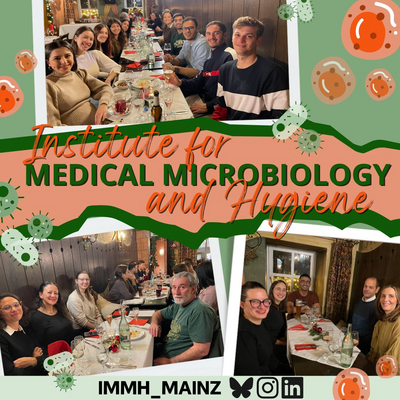Projects Offered
Petra Beli Dorothee Dormann Ulrich Hohmann René Ketting Edward Lemke Stamatis Papathanasiou Eva Wolf Johannes Mayer_Ageing Johannes Mayer_Dynamics Daniel Sasca Natalia Soshnikova Tim Sparwasser Ari WaismanCharacterization of critical metabolic pathways for T-cell subsets during aging
2 PhD projects offered in the IPP summer call Molecular Biomedicine & Ageing
Scientific background
T-cell aging is associated with an imbalance in naïve and memory T-cell subsets, as well as an accumulation of senescent and exhausted T-cells. These changes contribute to increased vulnerability to infections, reduced vaccine efficacy, and heightened risk of autoimmune diseases in the elderly. Metabolic reprogramming plays a crucial role in controlling T-cell function, yet the specific metabolic pathways that govern T-cell aging remain poorly understood. Previous research suggests that mitochondrial oxidative phosphorylation (OXPHOS) and other key metabolic processes influence T-cell fate decisions. Targeting these pathways could provide novel strategies to mitigate immune aging and enhance immune responses in older individuals.
PhD project: Characterization of critical metabolic pathways for T-cell subsets during aging
Two PhD positions are available to investigate the metabolic mechanisms underlying T-cell aging. T-cell aging is characterized by an imbalance in naïve and memory T-cell subsets and an accumulation of senescent and exhausted T-cells, contributing to increased susceptibility to age-related diseases. While metabolic processes play a crucial role in T-cell function, a comprehensive understanding of how metabolism regulates T-cell aging remains elusive. This project will leverage cutting-edge technologies to identify metabolic pathways that support naïve T-cell maintenance and drive the differentiation of memory, senescent, and exhausted T-cells with age.
The PhD candidates will work on:
- Identifying key metabolic pathways involved in T-cell aging using advanced genetic models that allow for parallel CRISPR perturbation of multiple metabolic genes at the single-cell level.
- Determining the impact of metabolic gene perturbation on T-cell subsets at different ages by employing single-cell RNA sequencing (scRNA-seq) and gRNA-capturing techniques.
- Assessing metabolic pathways that modulate aged T-cell function using inducible genetic systems in aged mice following antigenic challenge with model antigens and adjuvant vaccination.
The findings will reveal how metabolic reprogramming can potentially mitigate T-cell immunoaging and enhance immune function in the elderly.
For these PhD positions experience in both bioinformatics and immunology, particularly T-cell biology, is desirable. Additionally, familiarity with molecular biology techniques (e.g., CRISPR/Cas9, RNA sequencing, flow cytometry) is advantageous.
These projects provide an excellent opportunity to develop expertise in immunometabolism, aging research, and cutting-edge genomic techniques. The candidates will gain experience with advanced technologies such as scRNA-seq, CRISPR perturbation screening, and high-throughput immunological assays. The research is expected to yield high-impact publications and provide networking opportunities through international collaborations and conference presentations. These PhD positions will prepare the candidates for a successful academic career in immunology and metabolic research.
If you are interested in this project, please select Sparwasser your group preference in the IPP application platform.
Publications relevant to the project
Kao Y et al. (2025). Metabolic reprogramming of interleukin-17-producing γδ T cells promotes ACC1-mediated de novo lipogenesis under psoriatic conditions. Nature Metabolism. Pre press.
Almeida, L., Dhillon-LaBrooy, A., & Sparwasser, T. (2024). The evolutionary tug-of-war of macrophage metabolism during bacterial infection.Trends in endocrinology and metabolism: TEM, 35(3), 235–248.Link
Almeida, L., Dhillon-LaBrooy, A., Carriche, G., Berod, L., & Sparwasser, T. (2021). CD4+ T-cell differentiation and function: Unifying glycolysis, fatty acid oxidation, polyamines NAD mitochondria. The Journal of allergy and clinical immunology, 148(1), 16–32.Link
Zeng, N., Capelle, C. M., Baron, A., Kobayashi, T., Cire, S., Tslaf, V., Leonard, C., Coowar, D., Koseki, H., Westendorf, A. M., Buer, J., Brenner, D., Krüger, R., Balling, R., Ollert, M., & Hefeng, F. Q. (2022). DJ-1 depletion prevents immunoaging in T-cell compartments. EMBO reports, 23(3), e53302.Link
Almeida, L., Dhillon-LaBrooy, A., Castro, C. N., Adossa, N., Carriche, G. M., Guderian, M., Lippens, S., Dennerlein, S., Hesse, C., Lambrecht, B. N., Berod, L., Schauser, L., Blazar, B. R., Kalesse, M., Müller, R., Moita, L. F., & Sparwasser, T. (2021). Ribosome-Targeting Antibiotics Impair T Cell Effector Function and Ameliorate Autoimmunity by Blocking Mitochondrial Protein Synthesis. Immunity, 54(1), 68–83.e6.Link
Raud, B., McGuire, P. J., Jones, R. G., Sparwasser, T., & Berod, L. (2018). Fatty acid metabolism in CD8+ T cell memory: Challenging current concepts. Immunological reviews, 283(1), 213–231.Link
